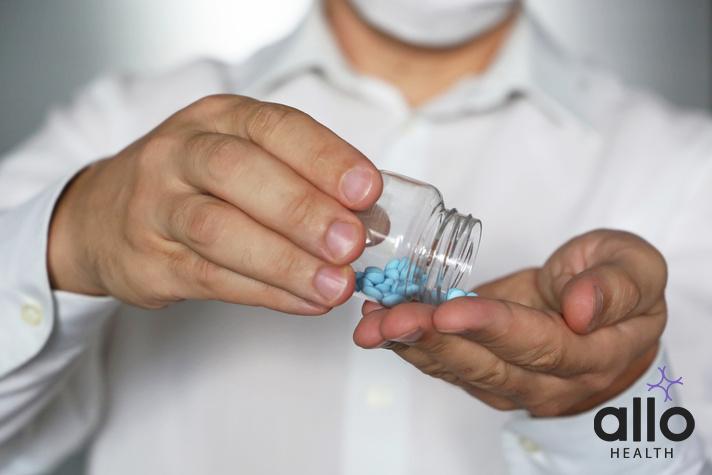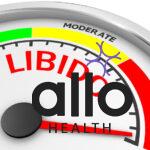How Does Spironolactone Affect Sex Drive?

Allo Health is dedicated to personalized well-being, offering support and trusted information tailored to individual health goals. The platform emphasizes human-generated content, led by a distinguished medical team of experts, including physicians and sexual health specialists. Their commitment to credibility involves rigorous fact-checking, authoritative research, and continuous updates to ensure accurate, up-to-date information. Allo Health's unique approach goes beyond conventional platforms, providing expert-led insights and a continuous commitment to excellence, with user feedback playing a crucial role in shaping the platform's authoritative voice.

Dr Sanina Mansoor holds MBBS degree from Yenepoya university,Mangalore.She has 8 years of experience working as a medical officer at various health centres and medical colleges.
Why This Was Upated?
Our experts continually monitor the health and wellness space, and we update our articles when new information became available.
Updated on 06 February, 2024
- Article was updated as part of our commitment to diversity, equity, and inclusion.

"The following blog article may discuss medical treatments and interventions. However, it is important to note that the information provided is for general educational purposes only and should not be considered as a substitute for professional medical advice, diagnosis, or treatment. Always seek the guidance of a qualified healthcare professional for personalized medical advice.
Book consultation
Medical treatments are complex and should be tailored to individual circumstances. The information presented in this blog may not be applicable to everyone, as each person's medical condition, history, and needs are unique. Only a qualified healthcare professional can evaluate your specific medical situation, consider relevant factors, and provide appropriate recommendations for diagnosis, treatment options, and monitoring.
It is crucial to note that self-diagnosis, self-medication, or relying solely on the information provided in this blog for treatment decisions can have serious health consequences. "
Spironolactone is a medication primarily used to treat medical conditions such as hypertension (high blood pressure) and heart failure. However, it is also known to have some potential effects on sexual function, which can be a concern for both male and female patients. In this article, we will delve into the various aspects of how spironolactone affects sex drive, including its dosage, adverse effects, alternatives, and more.
What is Spironolactone?
Spironolactone is a medication used to treat various medical conditions, primarily related to cardiovascular health and fluid balance. Here are key points about spironolactone:
- Medical Uses: Spironolactone is prescribed to manage conditions like hypertension (high blood pressure) and heart failure.
- Aldosterone Blocker: It belongs to the class of drugs known as aldosterone receptor antagonists, acting to inhibit the hormone aldosterone.
- Fluid Regulation: By blocking aldosterone, spironolactone helps the body maintain a balance of sodium and potassium levels, which is crucial for controlling blood pressure and fluid retention.
- Cardiovascular Benefits: It is effective in reducing the risk of cardiovascular diseases, including heart failure.
- Potential Side Effects: Spironolactone may have side effects on sexual health, including erectile dysfunction, decreased libido, and orgasmic dysfunction, particularly in higher doses. It can also lead to breast growth in female patients due to altered hormone levels.
- Dosage: The dose of spironolactone varies based on the medical condition being treated, with higher doses used for heart-related conditions.
- Alternative Treatments: For individuals experiencing adverse effects, healthcare providers can explore alternative medications or treatment strategies.
- Consultation: It’s crucial to consult a healthcare professional before starting or discontinuing spironolactone to ensure it’s appropriate for the specific medical needs and to monitor potential side effects.
Impact of Spironolactone on Sexual Health
Spironolactone, primarily used to treat hypertension and heart conditions, can have a significant impact on sexual health, with various effects and considerations:
- Erectile Dysfunction: Male patients may experience erectile dysfunction as a side effect of spironolactone, affecting their ability to achieve and sustain an erection.
- Orgasmic Dysfunction: Both genders may encounter difficulties in reaching orgasm, which can lead to sexual dissatisfaction and frustration.
- Ejaculatory Dysfunction: Men may face concerns with ejaculation, such as delayed or premature ejaculation, impacting sexual satisfaction.
- Libido Changes: Some individuals may notice decreased libido or sexual desire, affecting their interest in sexual activities.
- Hormone Imbalance: Spironolactone can alter hormone balance, particularly in female patients, leading to increased testosterone levels. This may result in unwanted side effects like breast growth.
- Dose-Dependent Effects: The dosage of spironolactone plays a crucial role in its impact on sexual health, with higher doses potentially intensifying these side effects.
- Alternative Treatments: For those concerned about sexual health concerns or experiencing adverse effects, consulting a healthcare provider is vital. They can explore alternative treatments or medications with fewer sexual side effects.
- Clinical Studies: Healthcare professionals can monitor patients and conduct clinical studies to find effective treatments while minimizing negative impacts on sexual function.
Spironolactone’s influence on sexual health encompasses erectile dysfunction, orgasmic and ejaculatory dysfunction, libido changes, and hormone imbalances. Dosage, alternative treatments, and clinical studies are crucial aspects to consider when addressing these concerns.
How Does Spironolactone Affect Sex Drive?
Spironolactone, a medication primarily used for heart failure, high blood pressure, and certain types of edema, can also impact sex drive due to its anti-androgen effects.
- Hormonal Effects: Spironolactone acts as an anti-androgen. Androgens, like testosterone, play a significant role in sexual drive and function.
- Reduce Libido in Men: In men, spironolactone can lead to decreased testosterone levels and increased estrogen levels, potentially reducing libido.
- Effects in Women: In women, the impact on sex drive is less clear. While it can reduce excessive androgen levels (beneficial in conditions like PCOS), its overall effect on libido varies individually.
- Erectile Dysfunction: For men, the altered hormone levels can lead to erectile dysfunction, indirectly affecting sexual desire.
- Experience Breast Tenderness and Enlargement: Both men and women may experience breast tenderness or enlargement, which can influence sexual comfort and desire.
- Individual Variability: Response to spironolactone is highly individual. Some may experience a marked decrease in libido, while others notice minimal or no change.
- Mental Health Impact: Changes in body image or stress about side effects can also indirectly affect sex drive.
- Importance of Monitoring: Regular monitoring and consultation with a healthcare provider are crucial for managing any adverse effects on sexual health.
Each individual’s experience with spironolactone can vary, and these points highlight general trends rather than definitive outcomes for everyone.
Can Dosage Impact the Effect of Spironolactone on Sex Drive?

Yes, the dosage of spironolactone can indeed impact its effect on sex drive, and this relationship is influenced by various factors related to hormone regulation and individual medical conditions. Here are key points to consider:
- Dosage Variation: Spironolactone is prescribed at different doses depending on the specific medical condition it is treating, such as hypertension, heart failure, or endocrine dysfunction. Higher doses are often associated with a greater risk of experiencing adverse effects on sexual health.
- Hormone Balance: Spironolactone’s primary action involves blocking aldosterone, a hormone that regulates sodium and potassium levels. This can lead to an increase in testosterone levels, particularly in female patients. Elevated testosterone levels can contribute to sexual side effects, including decreased libido and breast growth.
- Erectile Dysfunction: In males, higher doses of spironolactone may increase the risk of erectile dysfunction, making it challenging to achieve or maintain an erection.
- Orgasmic and Ejaculatory Dysfunction: Both men and women may experience difficulties with orgasm and ejaculation at higher dosages of spironolactone, impacting overall sexual satisfaction.
- Consultation with Healthcare Provider: It is essential for individuals to consult with their healthcare provider or health care professional if they notice changes in their sexual function while on spironolactone. Adjustments in dosage or exploring alternative medications may be necessary to manage symptoms and maintain a healthy sex drive.
The dosage of spironolactone plays a critical role in its impact on sex drive, with higher doses potentially increasing the risk of sexual side effects due to hormone imbalance. Patients should always communicate their concerns with their healthcare provider for personalized guidance and potential dosage adjustments to ensure the medication effectively manages their medical condition while minimizing negative effects on their sexual health.
Tips to Manage Sexual Health While Taking Spironolactone

Managing sexual health while taking spironolactone, especially in cases where adverse effects like erectile dysfunction or decreased libido occur, is essential for overall well-being. Here are some strategies and tips:
- Consult a Health Care Professional: If you experience sexual side effects from spironolactone, seek medical advice promptly. Discuss your concerns and symptoms with your health care provider or health care professional.
- Review Medication Dosage: Evaluate the dose of spironolactone you are prescribed. Higher doses may increase the likelihood of sexual dysfunction. Discuss with your healthcare provider if a lower dose can be effective for your condition.
- Monitor Hormone Levels: Regularly monitor your hormone levels, especially testosterone, as spironolactone can affect them. This can help in managing symptoms and adjusting treatment accordingly.
- Alternative Treatments: Explore alternative medications or treatment options that may be less likely to impact your sexual health. Your healthcare provider can guide you in choosing the right treatment plan.
- Clinical Studies: Consider participating in clinical studies or trials that investigate the effects of spironolactone on sexual health and potential ways to mitigate these effects.
- Lifestyle Adjustments: Maintain a healthy lifestyle by staying physically active, managing your weight, and avoiding excessive salt substitutes. These factors can positively impact your overall cardiovascular health, which can indirectly influence sexual function.
- Support and Communication: Openly discuss your concerns with your partner or healthcare provider. Communication is key to addressing the emotional aspects of sexual health and seeking appropriate medical attention if needed.
Managing sexual health while taking spironolactone involves a proactive approach that includes regular medical consultations, monitoring of hormone levels, and exploring alternative treatments when necessary. Effective management can help individuals maintain a satisfying sexual life while addressing their underlying medical conditions.
Conclusion
Spironolactone is an effective treatment for various medical conditions, but its potential impact on sexual health should not be overlooked. It can lead to adverse effects such as erectile dysfunction, orgasmic dysfunction, decreased libido, and more, primarily due to its influence on hormone balance. Patients should always seek medical advice if they experience any concerning side effects while taking spironolactone. Health care providers can help manage symptoms and explore alternative medications or treatment strategies through clinical studies and careful monitoring.
Most Asked Questions
-
What is spironolactone, and why is it prescribed?
Spironolactone is a medication used to treat conditions like high blood pressure and heart concerns. It helps by managing the levels of certain chemicals in your body to keep your heart and blood vessels healthy.
-
Can spironolactone affect my sex drive?
Yes, it can. Some people may experience changes in their sexual health when taking spironolactone. This could include difficulties with erections, orgasms, or a decrease in sexual desire.
-
Is there a way to avoid these effects on my sex drive?
If you’re concerned about how spironolactone may affect your sex drive, it’s essential to talk to a healthcare professional. They can help you find the right treatment plan or suggest alternatives that may have fewer impacts on your sexual health.
-
How can I manage the side effects of spironolactone?
If you’re experiencing side effects like sexual concerns while on spironolactone, it’s crucial to seek medical advice promptly. Your healthcare provider can work with you to manage these symptoms and find the most suitable treatment for your medical condition while minimizing negative effects on your sexual well-being.






































